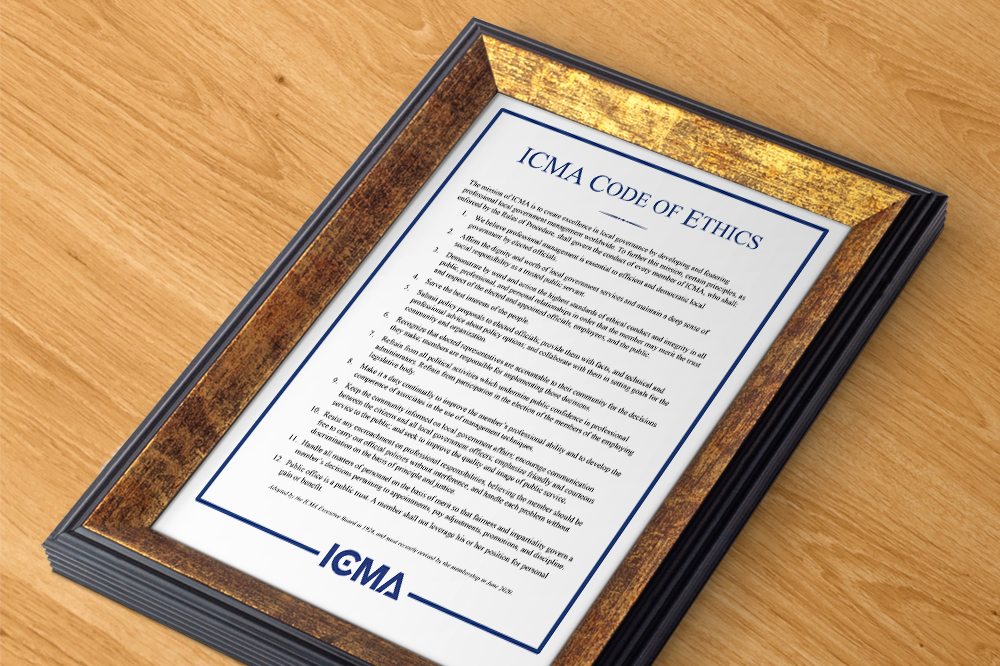
One critical element of ICMA’s approach to improving the ethics of the profession is to hold our members accountable for their conduct. When a member’s conduct raises ethical concerns, ICMA carries out a formal peer review process to objectively determine whether the member violated the ICMA Code of Ethics.
After all, if the profession doesn’t have a mechanism to enforce its high standards, what’s the value in having a Code at all?
Based purely on the trends, the likelihood that a member will go through the ICMA ethics enforcement process sometime in his or her career is very low. With a total membership of more than 12,000, the annual workload ranges from 40 to 50 cases.
However, the lack of familiarity with the enforcement process generates questions when incidents of wrongdoing hit the light of day. Given the profession’s commitment to accountability, ensuring that the process for enforcing the Code of Ethics is clear and understood is important. To add clarity, here are answers to frequently asked questions:
Who oversees the process?
The ICMA Constitution requires the ICMA Executive Board to establish a standing Committee on Professional Conduct (CPC). The rules by which the CPC enforces the Code are established by the Executive Board.
Who is on the CPC?
Each member is selected from the vice presidents elected by the members to serve on the Executive Board. They are peers who serve local governments in either the capacity of manager or assistant.
What’s the role of the CPC?
Operating under the rules established by the Board, the CPC investigate ethics complaints, has the sole authority to determine when a violation of the Code occurs, and recommends sanctions to the full Executive Board.
Who is covered by the Code of Ethics?
When joining ICMA, the individual agrees to comply with the Code. Members working for a local government, special district, municipal league, or council of governments—whether on a full-time, part-time, or interim basis, or as an intern—must adhere to the entire Code. Members who are working in another field, students, Life members, and retirees must follow Tenet 1 (Democracy) and Tenet 3 (Integrity).
When does ICMA launch a review?
A review will only be initiated when a valid written complaint is filed with ICMA. ICMA staff working on ethics issues do not initiate a review because their role is to administer the enforcement process. It would be a conflict of interest to serve both as the complainant and the administrator.
What constitutes a valid complaint?
The complaint must be in writing, clearly outline the alleged misconduct, and support the allegation with documentation. Next, we assess whether the alleged misconduct, if proven to be true, would be a violation of the Code. If the answer is yes, ICMA will proceed with the formal review.
Do I have an ethical obligation to file a complaint when I see unethical conduct?
If you are a member of ICMA, yes. The guideline under Tenet 3 states, “When becoming aware of a possible violation of the ICMA Code of Ethics, members are encouraged to report the matter to ICMA. In reporting the matter, members may choose to go on record as the complainant or report the matter on a confidential basis.”
Ethics complaints do come from the public, elected officials, and staff who are not members of ICMA. But we can’t rely on others to enforce our ethical standards. There is a whole universe of inappropriate conduct where the associated risk and potential damage may only be visible and really understood by another professional in the field. Therein lies part of the value of self-policing.
Do I have to go on record if I file a complaint?
No. You can request that ICMA regard you as an anonymous complainant. Your name will not be shared with any of the parties in the matter.
Is it confidential?
The entire review process is confidential unless and until it results in a finding by the ICMA Executive Board that a member has violated the Code and the appropriate sanction is a public one. Absent that, ICMA does not comment that a member may be under review and every ICMA member must maintain confidentiality about the review.
Does the ethics complaint process end if the member quits ICMA?
No! Once a case has been opened, ICMA will continue the process to its conclusion. That said, ICMA cannot open a case with a former member unless that person agrees to participate.
What about the member’s point of view?
The process begins with the assumption of innocence. After all, the information presented may not be accurate. And the member’s perspective on what transpired hasn’t been heard.
The member is given the opportunity to review the entire complaint and all documents. The member then has the chance to provide a detailed written response to the CPC. The opportunity to explain what transpired and provide supporting documentation, as well as statements from others, is key to getting at the facts.
The CPC reviews the member’s response and if the facts are clear, it will draw a conclusion as to whether the member’s conduct violated the Code. If the facts aren’t clear, the next step is to ask the state association to appoint a fact-finding committee. If the member fails to respond, the CPC will use a fact-finding committee to gather more documentation.
What role does fact-finding play?
Members assigned to the fact-finding committee gather the missing information and report back to the CPC within 60 days. They interview the member, may interview others connected to the case, collect public records, and in the case of legal matters, obtain court records. They do not determine guilt or innocence. The fact-finding committee submits its findings to the CPC for review. A copy of the report is provided to the member. This is the final step in the data-gathering process.
What are the penalties?
If the CPC concludes that the member did violate the Code, it can select from an array of censures, including private censure, public censure, suspension from membership for up to five years, permanent membership expulsion or bar, and credential revocation. All the options beyond a private censure require approval by the ICMA Executive Board.
Is there an appeal process?
Any sanction can be appealed to the Executive Board, where the member can address the board in an executive session hearing.
How is the outcome publicized?
ICMA notifies the complainant and the state association president that the matter has been resolved. When a public censure is issued, notice of that action is shared with the news media, as well as the appropriate governing body.
ICMA members must be willing to report in good faith matters of concern. Allow an objective peer review process to sort out the facts and reach an independent judgment. Consider the potential loss of public trust and confidence in the professionals who lead and manage local governments if our high ethical standards are not followed and uniformly enforced.

MARTHA PEREGO, ICMA-CM, is director of member services and ethics director, ICMA, Washington, D.C. (mperego@icma.org).
New, Reduced Membership Dues
A new, reduced dues rate is available for CAOs/ACAOs, along with additional discounts for those in smaller communities, has been implemented. Learn more and be sure to join or renew today!
